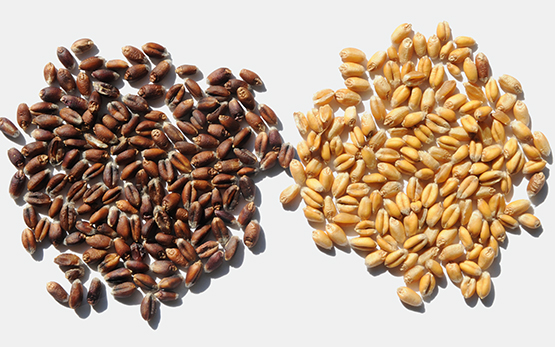
Wheat varieties with red and yellow grains contain high concentrations of anthocyanins and carotenoids with antioxidant properties. For several years now, Agroscope has been breeding varieties like these with high nutritional levels. These varieties also have enhanced resistance to Fusarium head blight and the associated accumulation of mycotoxins. They also have an excellent taste. To conclude: our coloured varieties are healthy, safe and delicious.
Drosophila suzukii: Little Damage to Soft Fruit
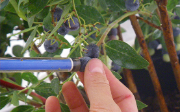
After 2014, when the spotted-wing drosophila, commonly called by its scientific name ‘Drosophila suzukii’, created major problems in all soft-fruit crops, 2015 has come and gone without too much damage. As soon as the presence of this pest was confirmed, preventive and control measures were put into place. Moreover, the high temperatures of summer 2015 helped to limit damage, since this pest has a problem with heat and dry conditions, and thus sought refuge in shady, humid zones. The control strategies developed by Agroscope and the high summer temperatures therefore enabled the effective control of Drosophila suzukii in 2015.
Cultivation of Cisgenic Potatoes on the Protected Site
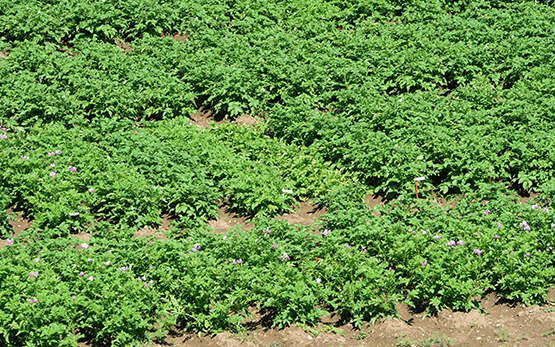
The second field season on the Protected Site – the Swiss federal government’s experimental field for studying genetically modified crops – came to a successful close in August 2015. One new development was a preliminary trial conducted by Agroscope with potatoes to which potato late blight resistance genes from wild potatoes were transferred via a genetic engineering technique. The aim of the project is to investigate the potential benefit for agriculture, as well as any possible environmental risks.
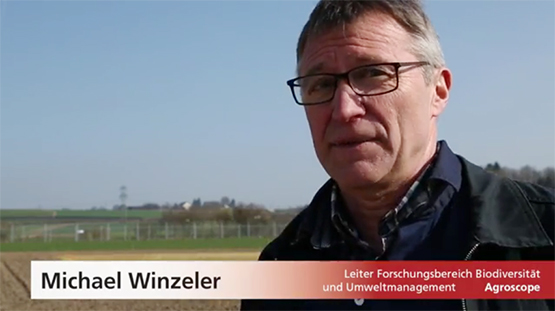
Application of Plant-Protection Products in Greenhouses
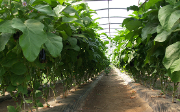
The effectiveness of plant-protection products depends, among other things, on the application technique used. Agroscope has developed a model for calculating the spray volume suited to the leaf-wall area of greenhouse crops in order to guarantee a better rate of leaf coverage. The application of this model, developed for trellised market-garden crops (tomatoes, cucumbers, aubergines and peppers), improves the efficacy of the products without increasing residues on the fruits. Moreover, the use of vertical bars with air assistance improves the quality and efficacy of plant-protection product application.
European Network against Quarantine Organisms
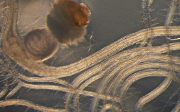
International trade has led to an increased risk of introduction and spread of quarantine organisms (insects, nematodes, bacteria, fungi). Through validated methods for detection and identification, national reference laboratories can prevent further introductions. In order to develop and implement diagnostic tests, reference collections are essential. The Q-collect project aims to improve the status of European reference collections by conducting inventories, developing guidelines for quality standards, and establishing a network for better accessibility. This will guarantee the prevention of future introductions through efficient diagnostic methods.
Increasing Efficiency in Apple Breeding
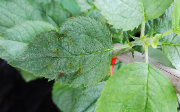
As part of the ‘Fruitbreedomics’ EU project, Agroscope conducted pilot studies on increasing efficiency in apple breeding. The focus here was on the breeding of varieties with high fruit quality, good yields, and two different scab resistance genes – two for long-lasting effectiveness. Modern SNP markers – in some cases developed in-house – allowed for the identification of specific genes for quality and resistance, thereby enabling selection of the most promising plants at an early stage of the breeding process.
Two Perennial Ryegrass Varieties Bred
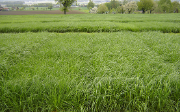
A cross between Italian ryegrass and perennial ryegrass, hybrid ryegrass is an important component of clover/grass mixtures where a fast-growing, competitive grass of greater persistence than Italian ryegrass is desired. In comparative trials with a total of 26 varieties, Agroscope has identified two new breeds of hybrid ryegrass that are of interest for Swiss forage production: the new variety G 0373, and G 0366.





